Flooring for Pharmaceutical Manufacturing Plants
If you manufacture drugs or medical supplies, your facility is used to meeting strict regulatory requirements. FDA safety regulations require you to uphold extremely high standards of safety and sanitation.

Furthermore, bioscience and pharmaceutical companies also adhere to current Good Manufacturing Practices (cGMPs) that help ensure safety and prevent contamination. For example, one cGMP requires manufacturing installation to maintain smooth, nonporous interior surfaces free of cracks and joints.
Even within those guidelines, however, you can enjoy a wide range of flooring options. Which one you choose depends on your company's unique requirements and preferences.
In general, your flooring installer should be able to lay a polymer floor that protects your company by staying FDA and USDA compliant, seals off any cracks where microbes could hide and flourish, and offers a slip-resistant and easy-to-clean surface.
Most importantly, you want to make sure your plant’s flooring works with you, not against you, in keeping your workers and end customers safe.
At CPC Floor Coatings, we work with you to recommend a customized flooring solution based on your pharmaceutical factory’s unique needs. We can install a combination of the following flooring options:
Let's solve your flooring problems together.
Epoxy Flooring
What is epoxy flooring?
This two-part coating chemically bonds to the surface of your floor, going down at least two millimeters. Epoxy's chemical bond makes this choice extremely durable and damage-resistant. It’s also impervious to liquid and easy to clean, creating a sanitary flooring option.
Epoxy floors come in several types, including epoxy mortar, quartz-filled epoxy, epoxy flake, and electrostatic charge resistant. Each type offers certain benefits, but most pharmaceutical companies choose electrostatic charge resistant epoxy because it retards flame — a must-have when dealing with chemicals and drugs.
Many pharmaceutical companies choose epoxy because it is non-toxic, seamless, and easy to clean.
How long do epoxy floors last?
In a heavily trafficked commercial space, epoxy floors last 2-3 years. That may not sound like long, but through regular maintenance, these floors can last many more years. Besides, we can always come back when you need us to add an epoxy coating at a much lower cost than installing a whole new floor.
How much does an epoxy floor cost?
In general, epoxy flooring can cost anywhere from $3 to $12 per square foot, depending on the type of epoxy you purchase, how you install it (roller, trowel, squeegee, or sprayer), and how many coats you need.
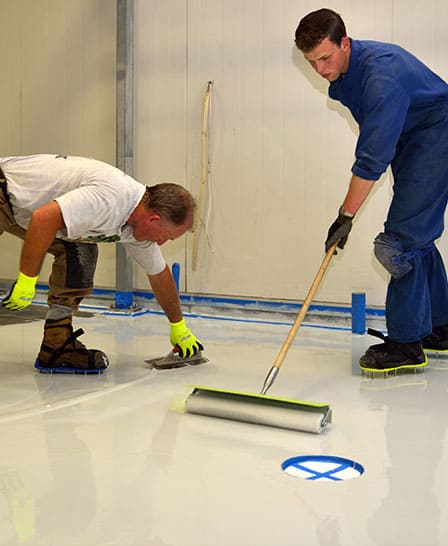
Urethane Flooring
What is urethane flooring?
In 1937, I.G. Farbin developed a flexible, durable, abrasion-resistant material now called urethane. World War II arms manufacturers used the product to build aircraft. Since then, urethane floors have played a major role in modern architecture.
Because urethane is such a thick compound, professionals put down the floor in a series of thin layers. Flooring experts have long regarded urethane floors as a reliable and affordable option for commercial spaces.
Urethane's durability makes it a popular choice for pharmaceutical manufacturers.
How long do urethane floors last?
Whether on its own or in combination with an epoxy coating, urethane is damage- and corrosion-resistant and stands up well under heavy traffic. Even professionally installed urethane floors, however, show wear when subjected to a lot of feet tramping across them. Most urethane floors need recoating about every 3-5 years.
How much does a urethane floor cost?
Urethane costs about $0.20 to $0.25 per square foot. With installation, a floor can run $0.95 to $1.10 per square foot.
CPC can give you a free estimate for a urethane floor specifically designed for your facility.
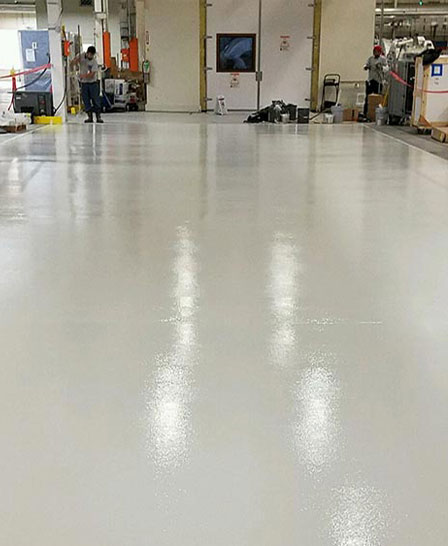
Polished Concrete Flooring
What is polished concrete flooring?
Polished concrete undergoes a multi-step process in which a concrete floor gets ground, cut, refined, and polished with abrasives. During the process, a chemical called a hardener penetrates the concrete and helps harden it. Glossy polished concrete can make a great impression in lobbies, hallways, and other customer-focused areas.
It is also one of the most sustainable environmental choices in flooring because we "manufacture" on the spot, don't need hazardous chemicals to lay it, and get a lot of energy efficiency from its dense composition. By the way, it's a myth that polished concrete floors keep a building colder in winter.
How long do polished concrete floors last?
A polished concrete floor that's been properly installed and maintained can last upwards of 20 years. These floors' potential longevity makes them one of the most affordable choices on the market. They're basically impossible to scratch so you probably won't even need to touch up these floors.
How much does a polished concrete floor cost?
Polished concrete costs can vary tremendously. Let us know if you'd like an estimate on a polished concrete floor from CPC.
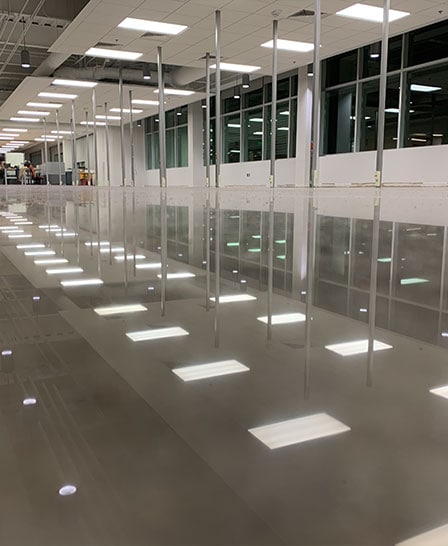
Safety Flooring
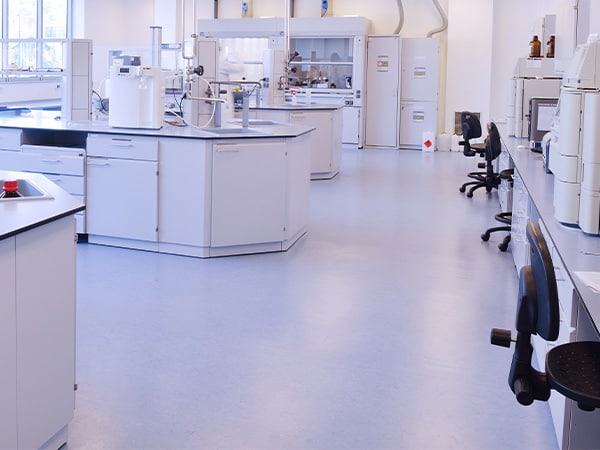
In a pharmaceutical manufacturing company, safety is paramount.
When we talk about flooring, safety means more than a non-slip surface. It really means a seamless surface. Seamlessness is important because the number one-way pathogens can enter a lab is on an employee's shoes.
Once tracked inside, these microbes can get carried all over the facility by transferring from shoe to shoe. Most pharmaceutical manufacturers require shoe coverings, which can help prevent pathogen dissemination.
But it's also important to lay seamless floors, which can greatly improve hygiene. Cracks and seams in floors can trap microbes, and standard cleaning practices may not remove them from these hiding places.
You can protect employees from injury with anti-slip flooring and use line striping to quickly communicate important process and safety information.
Extreme Chemical Resistant Flooring
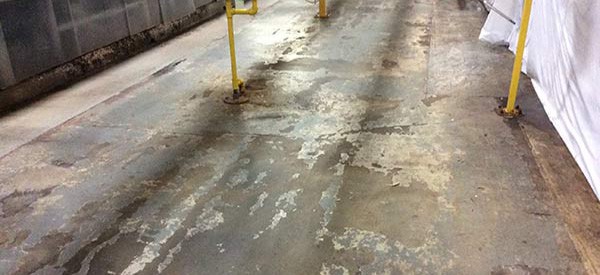
For sections in your pharmaceutical manufacturing plant that handle especially corrosive substances, we’ll help you select a heavy-duty coating that resists chemical damage and protects the floor beneath. Let us know if you're interested in having this discussion.
Our flooring experts would be happy to talk with you about your pharmaceutical plant's unique needs and tailor a solution to your budget. Call us now for a free consultation at (864) 855-0600, or contact us using the form at the top of this page.
